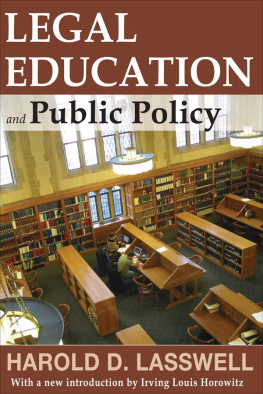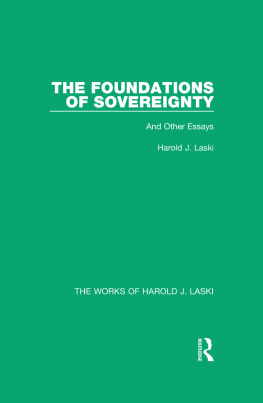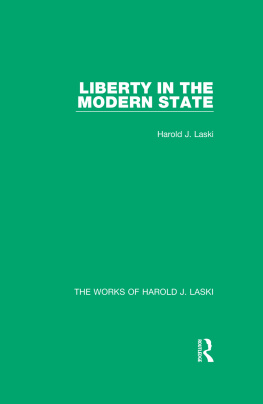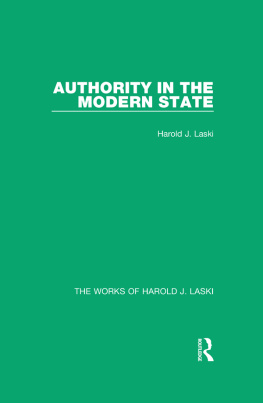First published 1997 by Transaction Publishers
Published 2017 by Routledge
2 Park Square, Milton Park, Abingdon, Oxon OX14 4RN
711 Third Avenue, New York, NY 10017
Routledge is an imprint of the Taylor and Francis Group, an informa business
Copyright 1997 by Taylor & Francis
All rights reserved. No part of this book may be reprinted or reproduced or utilised in any form or by any electronic, mechanical, or other means, now known or hereafter invented, including photocopying and recording, or in any information storage or retrieval system, without permission in writing from the publishers.
Notice:
Product or corporate names may be trademarks or registered trademarks, and are used only for identification and explanation without intent to infringe.
Library of Congress Catalog Number: 96-38936
Library of Congress Cataloging-in-Publication Data
Lasswell, Harold Dwight, 1902
Essays on the garrison state / Harold Lasswell ; edited and with an introduction by Jay Stanley ; with a preface by Irving Louis Horowitz.
p. cm.
Includes bibliographical references and index.
ISBN 1-56000-268-9 (alk. paper)
1. Civil-military relations. 2. Military government.
I. Stanley, Jay. II. Title.
JF195.C5L37 1996
322.5904dc20
96-38936
CIP
ISBN 13: 978-1-56000-268-0 (hbk)
Remembering Harold Lass well: Appreciating the Author of The Garrison State
Irving Louis Horowitz
When I accepted the responsibility of writing a Preface to Harold Lasswells prescient papers on the Garrison State, I had every intention of providing a basic overview of this critical concept and milestone in his work. But when I read the brilliant introduction by Jay Stanley, who also serves as the editor and inspiration for this volume, I realized soon enough that my intention would be terribly redundant. I would have ended up repeating what Professor Stanley had already said, and probably not nearly as convincingly or thoroughly.
I was faced with a difficult choice: telling Professor Stanley I had little to add to his fine remarks, and simply sending through a few encomiums that might be little more than a press release; or writing something original, that might even be of interest to Lasswell scholars, no less than students of political and military sociology. I chose the latter course, and I beg the indulgence of Professor Stanley for using this space, not to deflect from his own expert analysis of Lasswell, but rather to provide personal insight into a private man.
Many people have had a far lengthier and closer relationship to Harold Lasswell than I did. Indeed, I entered his world only in the final decade of Harolds lifea period marked by a certain quiet bitterness that peeked through the calm and reserve he allowed the outside world to see. He was such a private person that it must remain a mystery to his colleagues why his enormous intellectual output was so heavily focussed on the destructive and constructive aspects of personality factors. For a man sometimes described as the father of political psychology, it does seem somewhat curious how few people he allowed into his inner circle.
There is little purpose to repeating the rumors that were rampant about Harold during his life. Anyone so private necessarily invites speculation about what qualities really moved him. Rather than add to that sort of rubbish, I should simply like to record three special occasionsat least they were special for meon which we met, talked, argued, smiled, and walked away with a heightened sense of respect. Again, at least this was the case for me. I can only suggest that Harolds correspondence confirms the mutuality of this regard.
Our first major contact related to his manuscript The Signature of Power. This extraordinary work, yet to receive its proper due, attempted to show how the architecture of public places can be viewed as the physical representation of power. For reasons not altogether made clear by Harold, neither of his two major publishers of an earlier period, the University of Chicago Press nor Yale University Press, were interested in publication of this book. Both claimed that the market was limited for such a crossover book, and the use of a large number of halftones would make it an inordinately expensive undertaking.
Harold did not dispute the matter of costs, but he was sardonic, bordering on the sarcastic, in noting that neither of his major publishers balked at earlier works in which profits were high and royalties low. He first contacted Transactionand this was in 1977, when our book program was still in its infancyabout the publication of two works with which Harold was identified as a co-editor. The first was Patterns of Policy: Comparative and Longitudinal Studies of Population Events, in which he joined John D. Montgomery and Joel S. Migdal in a Harvard-sponsored activity that attempted to show possible linkages between demography and policymaking.
The second Transaction title with which he was linked as a contributing editor was a volume by John McHale and Magda Cordell McHale, Basic Human Needs. The human needs approach had emerged in the decade of the 1970s as a response to abstract, general notions of development that disguised political agendas behind economic systems theories. Anyone who knew Harold or his work can appreciate how he looked with disdain on abstractions that serve elite agendas rather than human needs. In short, even before we met in person, we had established a literary bond that made our initial meeting pleasant and easy going.
When Harold contacted me about The Signature of Power, we met in his New York apartment and the manuscript was laid out on the coffee table with the precision and neatness that those who knew him well understood was characteristic of the man. I read the book over the course of the next several hours, then simply pronounced our willingness to publish the work. I realized that the cost of photographic materials would be high, but the opportunity of publishing what, alas, turned out to be Harolds last full-scale manuscript was hardly an opportunity a relatively new mission-oriented social science publisher like Transaction could easily turn away. In any event, the book was so well written that we were spared the usual extra costs of copyediting.
After we agreed with a handshakeand that was a bond for us bothhe went on to explain how the idea of the garrison state helped underscore the message of the book. To be sure, many of the images in The Signature of Power relate to military installations, court houses, and maximum security prisons. For if the garrison state is real it must have a physical representation of itself. Harold observed that although most of the images in his book pertained to buildings in the West, the relationship of power to architecture was even more apparent in the dictatorial regimes of Stalins Russia, Hitlers new Berlin, and the Roman city of the future in Mussolinis Italy. He could not understand why so few political scientists had appreciated the obvious symbiosis of power and buildings in their efforts to identify the sources of state authority.
What I found interesting is how, as in his essays on the garrison state as such, Lasswell paid scant attention to distinctions between East and West, totalitarian and democratic regimes. It might be argued that this indifference is a weakness in Lasswells thinking, a failure to distinguish systems and ideologies one from the other. On the other hand, it might also be argued that it was his way of cutting through the sticky glue of ideology, to reveal how regimes actually workand how they enhance or mitigate their authority in the physical world. Indeed, one might argue that for Lasswell, such hard-headed considerations always weighed far more heavily in his analysis than broad theoretical frameworks. I do not mean to suggest that Lasswell harbored authoritarian instincts. He definitely did not! He did harbor a deep suspicion that underlying systemic differences were a thick layer of stratification that distinguished those at the top from those at the bottom. In this, notwithstanding his reservations for the European style as a whole, Harold was probably closer to the Franco-Italian School of power than the German-Austrian emphasis on authority.











